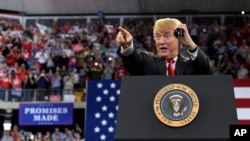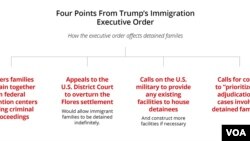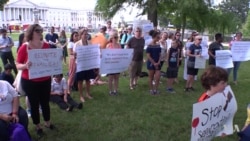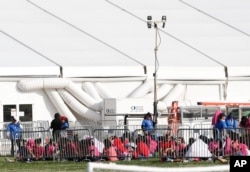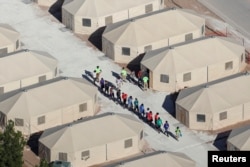A day after U.S. President Donald Trump reversed a policy of separating migrant families at the U.S.-Mexico border, Department of Homeland Security Secretary Kirstjen Nielsen said there is a plan to reunite the more than 2,000 children who have been detained apart from their parents.
"We have a plan to do that," the secretary told reporters at an event in Washington Thursday morning.
Shortly before she spoke, a VOA reporter at an immigration court hearing in Brownsville, Texas, said prosecutors dropped misdemeanor charges against 17 migrants. The migrants, who were separated from their children remain detained, but dropping the charges could be a means to reunite them and allow the families to be detained as units.
David Bier, an Immigration Policy Analyst at the libertarian Cato Institute, said if government prosecutors are dropping criminal charges in similar cases across the immigration court system, it calls into question the Trump Administration's 'Zero Tolerance' policy towards immigration. It's "an even more clear signal that the whole purpose of bringing these prosecutions is to separate parents from children and not about enforcing the law." he told VOA.
The administration's policy requires that anyone who crosses the border illegally face criminal charges. "If it continues to be the case that some of these cases or many of them are dismissed by courts – that should be the end of the policy," Bier added.
The moves come as the House of Representatives prepares to vote Thursday on a pair of immigration bills that address the separations, as well as other issues that have divided the country's major political parties.
Nielsen repeated her calls for lawmakers to act.
"I want to be very clear on this. Congress has the authority and responsibility to make the law of the land and to fix the immigration system," the secretary said. "We have done everything we can do in the executive branch."
The outcome of the votes is uncertain. One measure is more hard-line, while the other represents a compromise between the Republican Party's conservative and moderate wings.
WATCH: Immigration Bill Faces Uncertain Fate on Capitol Hill
In an early Thursday tweet, Trump expressed skepticism that any House immigration bill could get the necessary votes, blaming Democrats.
"What is the purpose of the House doing good immigration bills when you need 9 votes by Democrats in the Senate, and the Dems are only looking to Obstruct [which they feel is good for them in the Mid-Terms]. Republicans must get rid of the stupid Filibuster Rule-it is killing you!"
In another Thursday tweet, Trump also lashed out at Democratic leaders on the border issue.
"The Border has been a big mess and problem for many years. At some point Schumer and Pelosi, who are weak on Crime and Border security, will be forced to do a real deal, so easy, that solves this long time problem. Schumer used to want Border security - now he'll take Crime!"
The compromise bill includes a provision requiring children and their parents to be detained together if they cross the border illegally.
It would also provide $25 billion in funding for Trump's much-promised border wall, change the existing visa lottery into a merit-based system and provide a path to citizenship for the young undocumented immigrants who came to the United States as children.
Republicans hold a majority in both houses of Congress. Party leaders, including Trump and House Speaker Paul Ryan, have lobbied lawmakers this week in hopes of securing their support for the legislation.
"We can enforce our immigration laws without breaking families apart," Ryan said Wednesday before Trump announced he would sign an executive order to end breaking up families.
Change in course
The president's policy retreat followed a withering attack by Republican and Democratic officials who characterized the family separations as inhumane. The actions left parents with little or no information about where their children were being taken or when or how they would be reunited.
"It's about keeping families together while at the same time making sure that we have a very powerful, very strong border,' Trump said as he signed the document.
Trump's executive order went into effect immediately when he signed it, according to Gene Hamilton, counselor to U.S. Attorney General Jeff Sessions. However, he added, there will be an "implementation phase that follows."
"Right now we have the lawful authority to detain a family unit together for up to 20 days," Hamilton told reporters on a conference call following the signing of the order. But for extended detentions to keep families together beyond that timeframe it is "critically important" for Judge Dolly Gee of the U.S. District Court of Central California to make a ruling, according to Hamilton.
‘Zero-tolerance’ still stands
Under the order, the Homeland Security secretary will, with some exceptions, maintain custody of alien families while any legal proceedings concerning illegal entry or immigration status involving their members are pending implementation. It also instructs the Defense Department to provide or construct facilities to house the families. The Justice Department is ordered, "to the extent practicable," to "prioritize the adjudication of cases involving detained families."
The order also directs the Justice Department to seek a modification of a court order to permit families that enter the United States illegally to be detained together until their criminal proceedings are concluded.
The president emphasized that his administration's overall "zero-tolerance" policy on illegal immigration is not ending.
The U.S. in the last six weeks has separated more than 2,300 young children from their parents and sent them to detention centers, while charging their parents with illegally entering the country.
Business and religious leaders, four former U.S. first ladies and Trump's wife, Melania Trump, also voiced sharp criticism of the policy to split up migrant families, many of them escaping poverty and turmoil in Central America, as they illegally crossed the U.S. border.
National Security correspondent Jeff Seldin contributed to this report.




